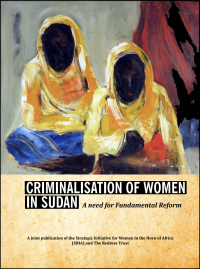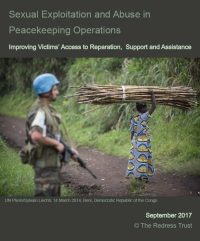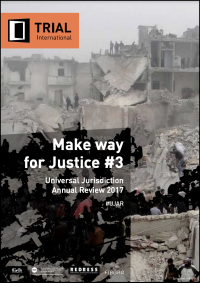Publications
REDRESS’ publications are also available in hard copy format. Please contact us for further information on [email protected].
This submission to the Universal Periodic Review of Chad, presented by REDRESS, the Chadian Association for the Promotion and Defence of Human Rights and Human Rights Watch, focuses on one issue: the Chadian government’s failure to make reparations to victims of Hissène Habré-era abuses despite its legal obligations and a 2015 decision by a Chadian court ordering it to provide compensation to over 7,000 victims.
The report, ‘Criminalisation of Women in Sudan: A Need for Fundamental Reform’, shows how public order laws, designed to protect morality, continue to disproportionately target women, who can face long spells in jail and flogging for infractions such as wearing ‘trousers’. Focusing on Khartoum state, the reports describes the experiences of some of the women most affected by the application of these laws, including alcohol brewers and sellers, human rights defenders, female students and migrant women. The report was written by the Strategic Initiative for Women in the Horn of Africa (SIHA) and REDRESS.
Les parties civiles devant la Cour Pénale Spéciale (« CPS ») sont victimes de violations graves du droit international. Par conséquent, les réparations symboliques ou morales, à elles seules, ne sont pas suffisantes pour remédier au préjudice subi. Le Règlement de procédure et preuve («RPP ») risquerait d’être en contradiction avec le CPP centrafricain et en violation des obligations internationales de la République Centrafricaine s'il devait restreindre la portée des réparations qui seraient appropriées pour réparer le préjudice subis par les parties civiles. Il est primordial que le RPP fournisse un cadre juridique pour que les victimes obtiennent réparation et que ce cadre soit conforme au droit international et réponde aux droits et attentes des victimes.
This report, co-authored by REDRESS and Avocats Sans Frontières (ASF), summarises the proceedings of a workshop on victim and witness protection at the International Crimes Division (ICD), the first domestic court in Uganda to try international crimes. Participants included ICD judges, registrar, prosecutors, and victims’ counsel, alongside national and international experts, who discussed which measures can be put in place to ensure the safety and well-being of victims and witnesses throughout the process despite the lack of protection laws and national protection mechanism.
Ce rapport a été rédigé par The Redress Trust (REDRESS) avec la contribution de la Fédération Internationale des ligues des Droits de l’Homme (FIDH), la Ligue Centrafricaine des Droits de l ‘Homme (LCDH) et l’Observatoire Centrafricain des Droits de l’Homme (OCDH) (ci-après les Organisations). Ce rapport présente une analyse de la conformité des règles de procédure pénale centrafricaines aux standards internationaux sur les droits des victimes et formule des recommandations sur la façon dont le Règlement de Procédure et de Preuve (RPP) pourrait combler certaines lacunes. Le rapport vise à identifier comment les droits des victimes pourraient être pris en compte de façon adéquate par le projet de RPP, sur la base des dispositions existantes en droit centrafricain ainsi que des standards internationaux.
This report analyses the steps taken by specialist bodies, UN organs and agencies as well as other international organisations engaged in peacekeeping to address victims' rights and needs following allegations of sexual exploitation and abuse by peacekeepers in countries including the Central African Republic, the Democratic Republic of the Congo and Haiti. It calls for fundamental changes to the way in which these cases are handled, with particular need for the recognition of victims right holders, rather than vulnerable recipients of charity or benevolence.
The African Union adopted a resolution in 2016 establishing the Trust Fund responsible for collecting and disbursing reparations to victims of ex-Chad dictator Hissène Habré. The Trust Fund has been mandated to search for and recover Habré’s assets and to seek voluntary contributions from States and other willing parties. This note – prepared by REDRESS and the Association Tchadienne pour la Paix et les Droits de l’Homme (ATPDH) – seeks to support the establishment of the Trust Fund for Victims by outlining what future Terms of Reference of the Trust Fund could look like. It was shared with the African Union Office of Legal Affairs and other key stakeholders involved in the establishment of the Trust Fund in April 2016.
This report, co-authored by REDRESS, TRIAL International, the International Federation for Human Rights (FIDH), the European Centre for Constitutional and Human Rights (ECCHR), and The International Foundation Baltasar Garzón (FIBGAR), looks back on the unprecedented momentum of Universal Jurisdiction in 2016. In 47 cases across 13 States, States implemented Universal Jurisdiction in order to prosecute criminals regardless of their nationality or where the crime was committed, proving the doctrine to be a significant practical tool against impunity in Syria, Rwanda, Nepal, Guatemala, Iraq, and elsewhere. REDRESS calls upon domestic jurisdictions around the globe to seize this growing opportunity to bring justice to the perpetrators of crimes against humanity, war crimes, and torture.



